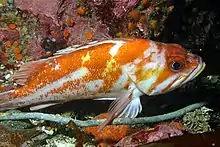Copper rockfish
The copper rockfish (Sebastes caurinus), also known as the copper seaperch, is a species of marine ray-finned fish belonging to the subfamily Sebastinae, the rockfishes, part of the family Scorpaenidae. It is found in the eastern Pacific.
| Copper rockfish | |
|---|---|
 | |
| Scientific classification | |
| Domain: | Eukaryota |
| Kingdom: | Animalia |
| Phylum: | Chordata |
| Class: | Actinopterygii |
| Order: | Scorpaeniformes |
| Family: | Scorpaenidae |
| Genus: | Sebastes |
| Species: | S. caurinus |
| Binomial name | |
| Sebastes caurinus J. Richardson, 1844 | |
| Synonyms[1] | |
| |
Taxonomy
The copper rockfish was originally described in 1844 by the Scottish naval surgeon, naturalist and Arctic explorer John Richardson with the type locality given as the Sitka, Alaska.[2] Some authorities place this species in the subgenus Pteropodus. The specific name caurinus means “northwestern”, an allusion to the type locality in Alaska.[3]
Description
Copper rockfish are known to be highly variable in coloration, ranging from a dark reddish brown, with pale copper blotching along the sides, to a lighter pinkish brown with a yellowish white mottling on the flanks. At one time it was thought that these variations were two different fish: Sebastes caurinus and Sebastes vexillaris - this is due to the northern and southern populations having different coloration (northern individuals having brown or olive coloration while southern individuals are closer to dull yellow or olive-pink).[4] It is now known however that it is simply one species. Copper rockfish are known to create and communicate with sound produced using the swimbladder and associated muscles; these sounds are used for agonistic behaviors, including territory defense.[5]
Distribution and habitat
The copper rockfish is a relatively common rockfish of the Pacific coast. It is very widespread in its distribution, known from the very northern reaches of the Gulf of Alaska, to the Pacific side of the Baja California peninsula, north of Guerrero Negro. The copper rockfish is also very widely distributed in depth, from the subtidal shallows of about 10 to 183 metres (33 to 600 ft).[1] It is a demersal fish which occurs in rocky areas with high relief.[6]
Biology
Copper rockfish males are known to mature between three and seven years, while females mature between four and eight years. Generally the larger a female is, the more young she will bear. Copper Rockfish are a viviparous fish giving birth to live young after a gestation period of around 10 months. They are a long-lived fish reaching ages of over forty years old with the oldest known individual being 55 years old. Copper Rockfish are a modest fish reaching a maximum size of 58 centimetres (23 in) TL and a weight of 2,740 grams (6.04 lb).[1]
Juveniles are almost exclusively found in kelp beds and shallow rocky areas. They begin life feeding primarily on planktonic crustaceans. As they grow they continue to feed on increasingly larger crustaceans such as shrimp and crabs as well as squid and octopus. Smaller fish also make up a large part of their diet. In turn copper rockfish are preyed on by lingcod and cabezone and even salmon. Sea birds and sea mammals also take their toll, and also man. Copper Rockfish are known for the table quality of their flesh and their willingness as a sportfish. The adult copper rockfish is found very close to the bottom often touching. They are almost always associated in and around rocks, and almost never on sand. This rockfish is known to be very faithful to its chosen home and numerous tagging studies have shown that these rockfish travel no more than a mile from their chosen location. In combination with habitat patchiness and limited larva dispersal distance, this behavior means separate populations genetics differ significantly from each other.[7]
Fisheries and conservation
The copper rockfish is an important component in commercial fisheries in western Mexico, caught using hook and line.[6] It is fished for by recreational anglers in California[8] but in Washington the copper rockfish has been classified as a Species of Greatest Conservation Need (SGCN) under that State's Wildlife Action Plan and as a "Priority Species" under Department of Fish and Wildlife's "Priority Habitat and Species Program" and the recreational fishery in Puget Sound has been closed.[9]
References
- Froese, Rainer; Pauly, Daniel (eds.) (2021). "Sebastes caurinus" in FishBase. June 2021 version.
- Eschmeyer, William N.; Fricke, Ron & van der Laan, Richard (eds.). "Species in the genus Sebastes". Catalog of Fishes. California Academy of Sciences. Retrieved 5 November 2021.
- Christopher Scharpf & Kenneth J. Lazara, eds. (22 May 2021). "Order Perciformes (Part 8): Suborder Scorpaenoidei: Families Sebastidae, Setarchidae and Neosebastidae". The ETYFish Project Fish Name Etymology Database. Christopher Scharpf and Kenneth J. Lazara. Retrieved 5 November 2021.
- Buonaccorsi, Vincent; Kimbrell, Carol; Lynn, Eric; Vetter, Russel (2011). "Population structure of copper rockfish (Sebastes caurinus) reflects postglacial colonization and contemporary patterns of larval dispersal". Canadian Journal of Fisheries and Aquatic Sciences. 59 (8): 1374–1384. doi:10.1139/f02-101.
- Stein, David; Hassler, Thomas (1989). "Species Profiles: Life Histories and Environmental Requirements of Coastal Fishes and Invertebrates (Pacific Southwest)". Google Books. Coastal Ecology Group, Waterways Experiment Station, U.S. Army Corps of Engineers. Retrieved 24 February 2021.
- "Copper rockfish". Mexican Fish. Retrieved 5 November 2021.
- Johansson, Mattias; Banks, Michael; Glunt, Katey; Hassel-Finnegan, Heather; Buonaccorsi, V (2008). "Influence of habitat discontinuity, geographical distance, and oceanography on fine-scale population genetic structure of copper rockfish (Sebastes caurinus)". Molecular Ecology. 17 (13): 3051–3061. doi:10.1111/j.1365-294X.2008.03814.x. PMID 18522692. S2CID 41329568.
- "Copper Rockfish". California Pier Fishing. Retrieved 5 November 2021.
- "Copper rockfish (Sebastes caurinus)". Washington Department of Fish and Wildlife. Retrieved 5 November 2021.
![]() Media related to Sebastes caurinus at Wikimedia Commons
Media related to Sebastes caurinus at Wikimedia Commons